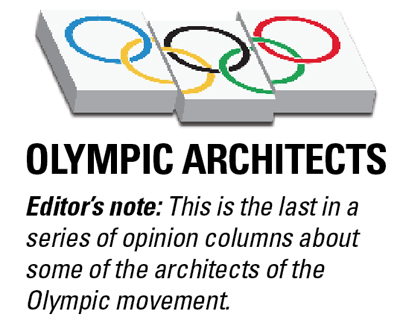As the highly successful London Olympics came to a close, there were probably very few senior sport leaders thinking about calling Peter Ueberroth. They were probably anxious to get out of London and start focusing their energies on the ramp-ups for Sochi, Russia, in 2014 and Rio de Janeiro in 2016.
But we’d advise those same titans of Olympic sport, be they International Olympic Committee administrators, sport ministers or sport CEOs, to think about arranging a short meeting with the former U.S. Olympic Committee board chairman to get his thoughts on how the Olympics have changed and will further morph in the future.
We made that call to the chief organizer of the 1984 Los Angeles Summer Olympics — the privately held, profit-generating Games that served as the turning point for the Olympics as a business. Ueberroth, 74, is one of the few Olympic architects who can look back on the past and comment, with clarity, on the “best practices” of past Games.
“Basically, when we received the Games for ’84, the people of Los Angeles had voted not to spend a single penny on the Olympics,” Ueberroth said. “So we studied all the previous Games, and it took us about 30 minutes to see that only 1948 in London made sense for how we could think about going forward. Remember, the Brits were on food rationing then and rebuilding their city less than a decade after getting bombed in the early ’40s. But they staged ’48 in a manner that worked.”
 |
For Ueberroth, that cost sensitivity is important in discussing how the Olympic movement must move forward in the 21st century. Interestingly, though, the former commissioner of Major League Baseball didn’t linger long on how staging costs had “grown by a factor of 10 to 20 times.” Similarly, his voice was not filled with concern when he noted that host city spending and Games gigantism was out of control or that some recent cities have “left legacies of costly and unused facilities that, in some cases, left a negative effect on troubled economies.”
It was something more than past inefficiency that concerned him.
“I think the immediate trend, going forward, is that fewer countries will be bidding in the next three to four cycles. We’re already seeing that for 2020, where the IOC is only allowing three cities [Istanbul, Madrid and Tokyo] to proceed toward the final vote [Sept. 7, 2013, in Buenos Aires, Argentina]. I wouldn’t be surprised to see more cities dropping out in the future thus keeping the IOC from having the robust list of candidate cities that we’ve seen in the past.”
How does the IOC resolve that?
“I really hope the IOC can encourage future bid cities by making the requirements much simpler, by requiring less expenditure, and that the actual bid process is not so expensive,” continued Ueberroth, who remembers a time when Los Angeles was the only city in the world willing to take on the job of hosting the Olympics. “It doesn’t serve anybody in the present world economy to have these Games costing the amounts they do.”
 |
Peter Ueberroth can comment with clarity about “best practices” of past Olympic Games.
Photo by: MICHAEL GOOD PHOTOGRAPHY
|
Numerous reports suggest that Chicago spent close to $80 million on its unsuccessful bid for the 2016 Games. If that trend continues, some IOC experts believe that only countries, not cities, will be able to afford the upfront bidding costs plus the full financial guarantee the IOC requires to stage the Olympics. Even in a moderately stronger economy, most American cities would have to think hard about whether they could convince taxpayers to go out on a limb for the Olympics, particularly when they know there will be no federal bailout.
Still, Ueberroth believes that an environment where Olympic bids will have many applicants can be continued.
“There was extremely positive change in the 2012 Games,” said Ueberroth, who visited London during the first few days of the Games. “Virtually everything there has a solid after-life and is very beneficial to the neighborhoods and country. It’s been a positive reversal to the three Games that preceded London. Sir Sebastian Coe has won another gold medal, to go with the one he won in L.A. in 1984 in the 1,500, with his leadership of the 2012 Games.”
Does Ueberroth think the U.S. could host the Games again, especially after the recent announcement the IOC and USOC had reached a new revenue-sharing agreement for the next 20 years?
“Larry Probst [current USOC chairman] has accomplished the difficult task of reframing a new financial relationship that appears to be fair to both the IOC and the U.S.,” Ueberroth said. “Things were at a place where the USOC administration during my term failed. It was a personal failure, not the people with me, to find an economic long-term agreement. What Larry has done removes one of the obstacles for a U.S. bid. There are other obstacles, but a carefully well thought out bid has a chance.”
If that’s right, perhaps Ueberroth’s Los Angeles legacy, in which Games were staged in 29 cities, nine counties and three U.S. states, might come back into play, and his counsel, rich with real history, would be again sought on how the IOC ensures more cities bidding, better use of funds and a more sustainable Olympic movement.
Rick Burton (rhburton@syr.edu) is the David B. Falk Professor of Sport Management at Syracuse University and the former chief marketing officer of the U.S. Olympic Committee (during the time Peter Ueberroth was USOC board chairman). Norm O’Reilly (norman.oreilly@uottawa.ca) is an associate professor at the University of Ottawa and was a member of the 2004, 2008 and 2010 Canadian Olympic Committee mission staff.






